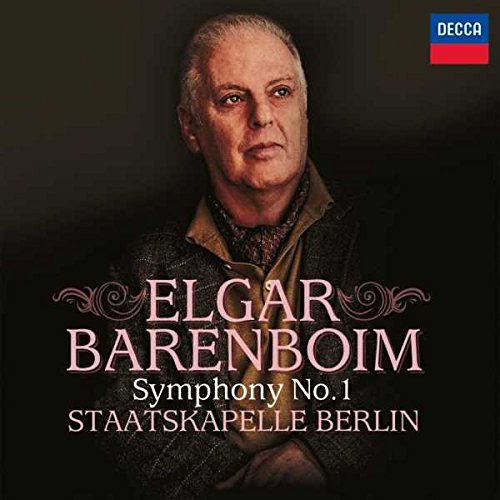ELGAR Symphony No 1
View record and artist detailsRecord and Artist Details
Composer or Director: Edward Elgar
Genre:
Orchestral
Label: Decca
Magazine Review Date: 05/2016
Media Format: CD or Download
Media Runtime: 51
Mastering:
DDD
Catalogue Number: 478 9353DH

Tracks:
| Composition | Artist Credit |
|---|---|
| Symphony No. 1 |
Edward Elgar, Composer
Berlin Staatskapelle Daniel Barenboim, Conductor Edward Elgar, Composer |
Author: Edward Seckerson
Barenboim’s long association with, and love for, Elgar has effectively made it part of his musical DNA. He understands its particulars and, to put it simply, he knows how it goes. And because he is a master he has somehow communicated all of that, both in practical and spiritual terms, to an orchestra for whom it is relatively unfamiliar. That is the really startling achievement here and it manifests itself in playing that is as exciting as it is nuanced and which can turn on a sixpence because Barenboim and his players ‘read’ each other so well. That which might sound mannered in other hands (though it must be said that Barenboim has matured and refined his ‘expressivity’) is here so naturally achieved.
He has mastered the long and difficult first movement chronicling the turbulence of an era – indeed of life in general – in which tiny oases of peace and tranquillity open up as if recalling happier times. The scoring is so fragrant and beautiful in these Elysian departures and the subtle balancing of leading and accompanying voices makes for some unique Elgarian colours. Indeed, the recording balance generally (producer Andrew Keener) is exemplary, the ear constantly arrested by telling details so often absorbed into the overall richness of Elgar’s soundscape.
But to return again to the structure of this first movement, it is Barenboim’s command of transition, of ebb and flow, storm and stress, that carries all before it. Those fleeting reveries are soon buffeted by the prevailing winds of change and Barenboim does not spare the rhetoric in conveying the anguish of what that means in the context of the symphony as a whole. The returning motto theme – one of Elgar’s noblest processionals – is heavily indecisive in the closing minutes of the movement. Doubt and a sense of unfinished business prevail.
In Barenboim’s fiercely dynamic approach to the scherzo – full of martial gung‑ho – we know why. It is as if the music is scenting impending strife (premonitions of the Great War) and there is no small irony here in its Teutonic brashness. Again, the trio feels like a conscious distraction from the fearful and the gradual winding-down into the great slow movement is marvellously achieved.
If the symphony, as Elgar himself suggested, is essentially a formal expression of human experience with all its trials and tribulations but ultimately a need to ‘come home’ with hope, then the First Symphony’s slow movement is where everything is put into perspective and all of life’s disappointments and regrets are tempered with a deeper sense of resignation. Complex character that Elgar was, that found its way into the writing and Barenboim’s generously sounded account of this wonderful movement makes such capital of the depth achieved in the subdivisions of the string-writing. I know that the peculiarly English accent is very much written into this music but his Staatskapelle Berlin seem to feel it intuitively, not least with regard to its deep and abiding sense of consolation. That is universal, of course, and reminds me of a very well-known conductor who observed that if Elgar had been born in Austria he’d have been called Mahler.
The quiet hush of resignation at the close of the movement (achieved at a price, we are made to believe) is breathtaking without feeling affected – as in super-hushed for theatrical effect – still retaining its full tone, and the pale, wistful clarinet peeping through in the final bar again reminds us how subtle Elgar’s colorations are.
And so the finale is upon us, with the motto theme darkly disguised. Barenboim’s drive through the movement’s development feels like a kind of celebration of what the symphonic allegro can generate in terms of energy, and it is only when it finally does abate into a kind of repose that you instinctively know that something wondrous this way comes. The transformation of that darkly ominous march into something radiant and transcendental is quite simply one of the great moments in English (or any) music, and Barenboim and his orchestra ease us so gently into this revelation that the climax when it comes sings all the more gloriously.
The ‘triumphant’ return of the motto is quite thrilling and again quite unlike anything else in Elgar: those euphoric sforzandos really make the heart leap in what has to be one of the most original depictions of hard-won jubilance in music. The dense swelling of the orchestration in these pages sounds marvellous here with again exemplary balances.
So there isn’t a tempo, a turn of phrase or a rubato anywhere that I would take issue with. More importantly, the whole feels thoroughly integrated and gloriously spontaneous. This is up there, you’ll have gathered, with the very finest that the gramophone has yet given us of this great – and finally, I hope, universally celebrated – symphony.
Discover the world's largest classical music catalogue with Presto Music.

Gramophone Digital Club
- Digital Edition
- Digital Archive
- Reviews Database
- Full website access
From £8.75 / month
Subscribe
Gramophone Full Club
- Print Edition
- Digital Edition
- Digital Archive
- Reviews Database
- Full website access
From £11.00 / month
Subscribe
If you are a library, university or other organisation that would be interested in an institutional subscription to Gramophone please click here for further information.




